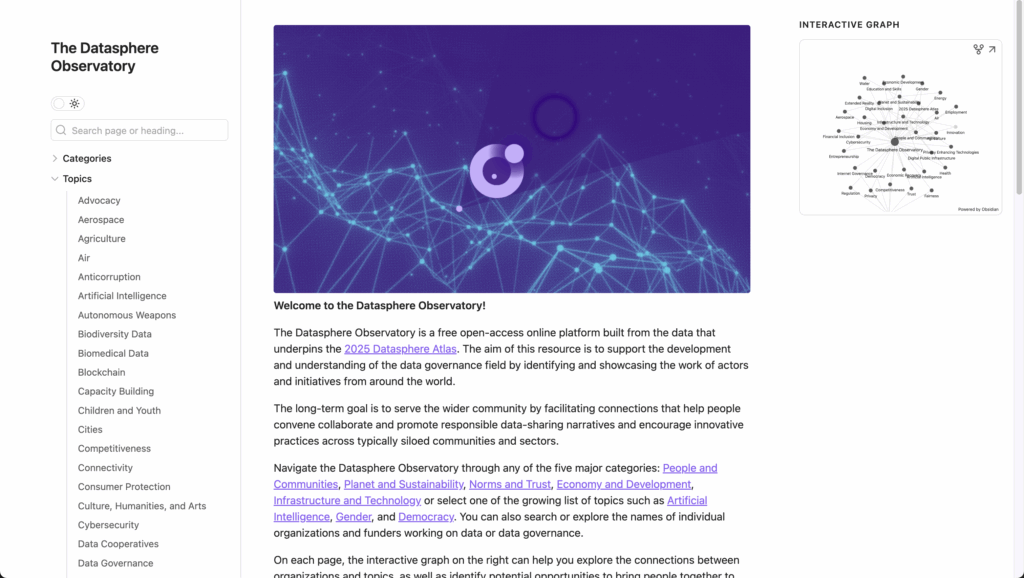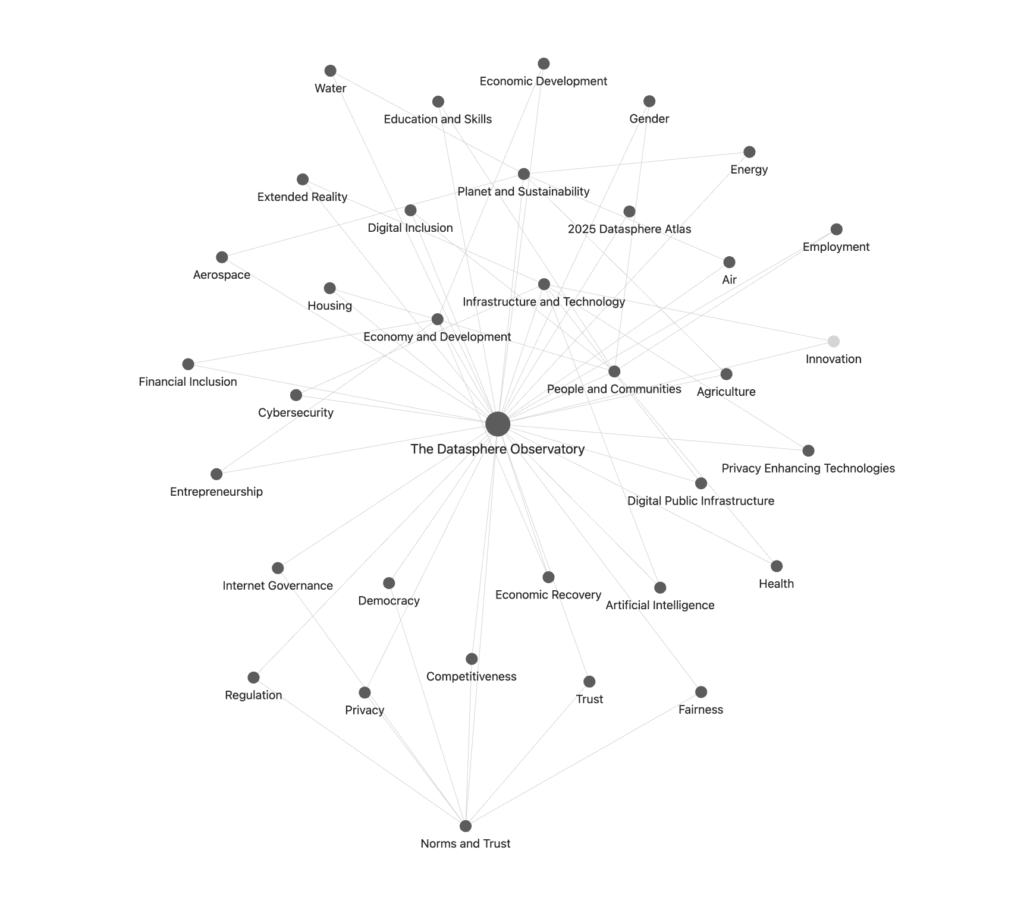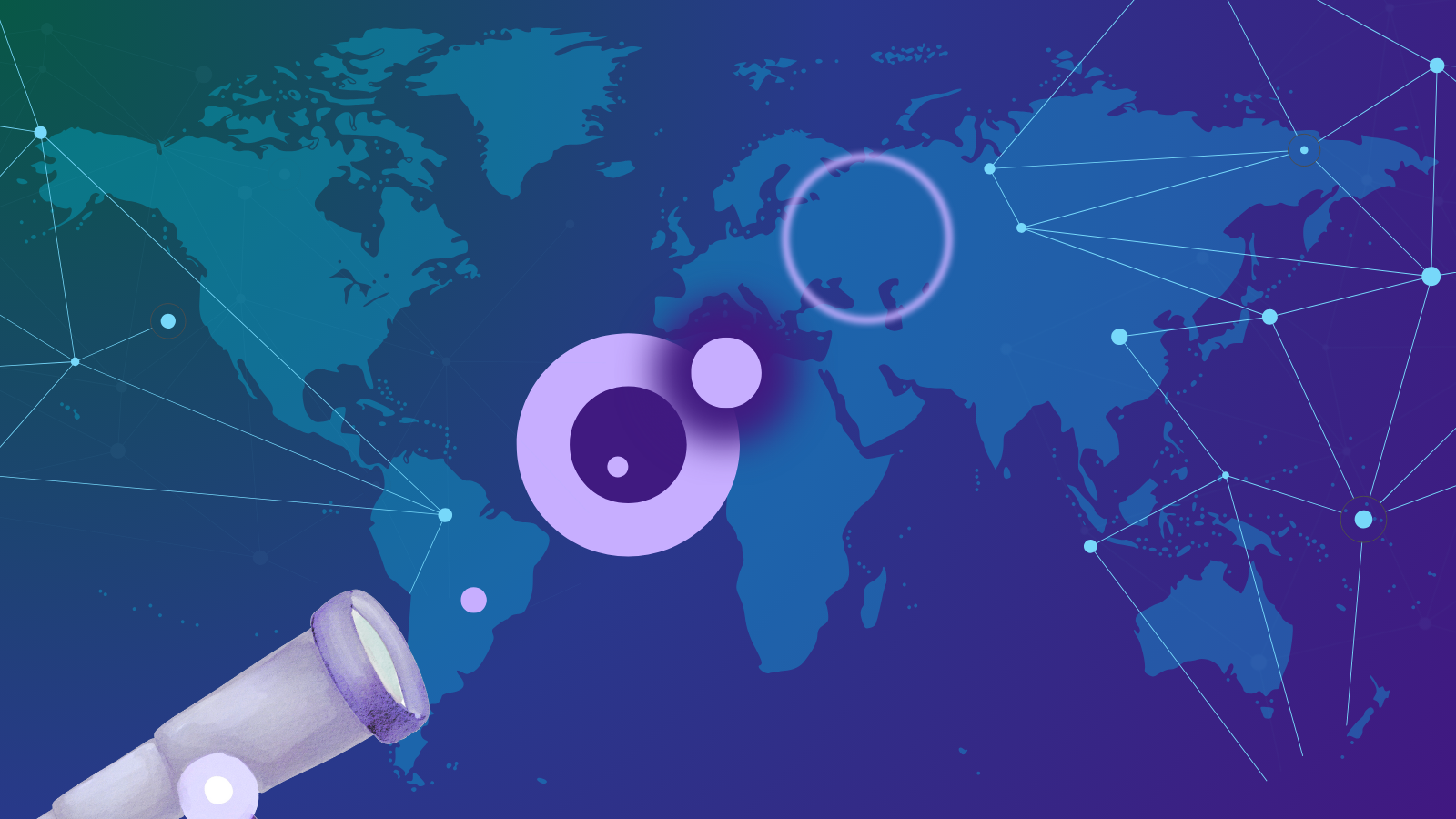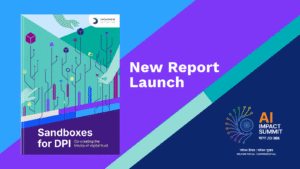The Datasphere Observatory is a global platform designed to help stakeholders navigate the data-for-good ecosystem.
By consolidating information that would otherwise be scattered across websites or outdated directories, the Observatory cuts through the noise and helps you spot partners, funders, and knowledge hubs faster.
With its powerful filters and graph-based navigation, you can:
- Filter by topic, geography, type of actor, or funding role
- Use backlinks and graph views to uncover relationships and trends
- See who’s working on what — and with whom

What This Guide Offers
This article serves as a practical manual for using the Datasphere Observatory. It shows how different types of organizations and professional profiles can use the platform to meet their goals.
If you are a researcher, policymaker, or civil society leader, the Observatory offers different pathways to find the knowledge, actors, and opportunities that matter to you.
For Researchers and Academia
If you’re a researcher exploring data governance, the Datasphere Observatory gives you a direct look into who’s doing what beyond academic circles:
- Let’s say you’re writing a comparative paper on regulatory sandboxes in emerging markets. You type “Education and Skills” in the search bar and go to the topic page. You will, for instance, Women in Data, an organization focused on increasing diversity in data careers. You can follow the link to their external site, see who funds them, and maybe even reach out for interviews or co-authorship.
- Need to align a grant proposal with funder priorities? Go to the “Open Science” topic. Click on the organization’s name like Committee on Data for Science and Technology (CODATA) to explore the organizations they support, giving you insight into what kind of research and geography they prioritize.
- And if you’re curious about how NGOs or private organizations are applying the concepts you study, select “NGO” or “Private Organization” within any topic. For example, on “Privacy Enhancing Technologies,” you might find Zama, a cryptography company building open source homomorphic encryption solutions for blockchain and AI, helping you bring grounded examples into your next paper or seminar.
For Government / Policy Advisors
If you’re advising on public policy, regulation, or digital transformation, the Datasphere Observatory helps you find what others are doing and who’s doing it well.
- Suppose your agency is drafting new rules for eHealth. You search for “Health” and open the topic page. From there, you see a list of organizations working on the same issues. You discover Genomic Data Commons, an agency providing the cancer research community with a unified repository and cancer knowledge base that enables data sharing across cancer genomic studies in support of precision medicine. Their profile links to more info, so you can learn directly from their experience or even connect.
- Want to understand how your counterparts operate in your language? Use the “Language” filter to see all organizations with content or activity in Spanish, French, or Portuguese. Let’s say you filter for Spanish and find the Ecuadorian Open Data and Metadata Network, a public sector network focusing on identifying and making visible the problems associated with access to information and open data. Their topic areas might be broad, but you get valuable entry points for future conversations or inspiration.
For NGOs / Civil Society
If you’re in civil society, the Datasphere Observatory is your map to allies, donors, and others tackling similar issues no matter where they’re based.
- Let’s say your organization is launching a campaign on “Trust” in digital services. You search for the topic. Dozens of groups appear, each working in different countries. You come across California Data Collaborative (CaDC), a network of water professionals collaborating to create tools and applied research supporting planning and analysis. Their strategy aligns with yours and since their profile links to their case studies and website, it’s easy to reach out and explore collaboration.
- Writing a grant proposal on “Digital Inclusion”? Go to that topic and you will find, for example, Omidyar Network, a philanthropic foundation actively supporting civil society in this area. Their page shows other grantees they support, which helps you tailor your proposal and identify how your work fits the bigger picture.
Whether you’re applying for funding or looking for peer support, the Datasphere Observatory saves hours of cold calls and guesswork.
For Funders / Philanthropy
If you’re a funder looking to support effective, aligned, and inclusive data work, the Datasphere Observatory gives you a panoramic view of the landscape.
- Let’s say you’re interested in funding around “Sustainability.” You search the topic and find groups like Amazonia Socioambiental, a local initiative using open environmental data to support climate resilience. Their page links to their work and reveals other funders backing similar themes.
- Want to understand what your philanthropic peers are doing? Within topics like “Security and Safety,” you can find, for instance, William and Flora Hewlett Foundation, whose profile includes a breakdown of grantees and areas of investment. This helps you avoid duplication, identify co-funding opportunities, or align with adjacent strategies.
The Observatory helps you fund smarter not just faster. You see where momentum is building, where the gaps are, and who’s already doing the work.

Conclusion
Behind every dataset and every initiative are people striving to use data responsibly to improve lives and tackle global challenges.
The Datasphere Observatory shines a light on these efforts and opens the door for new collaborations.
It is a space where funders find innovators, researchers find case studies, and policymakers find peers. Most importantly, it is a tool that helps all of us unlock the value of data for the common good.
Begin exploring the Datasphere Observatory today to discover organizations, partners, and opportunities that can accelerate your work: Explore the Datasphere Observatory



